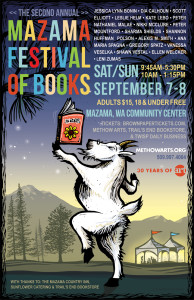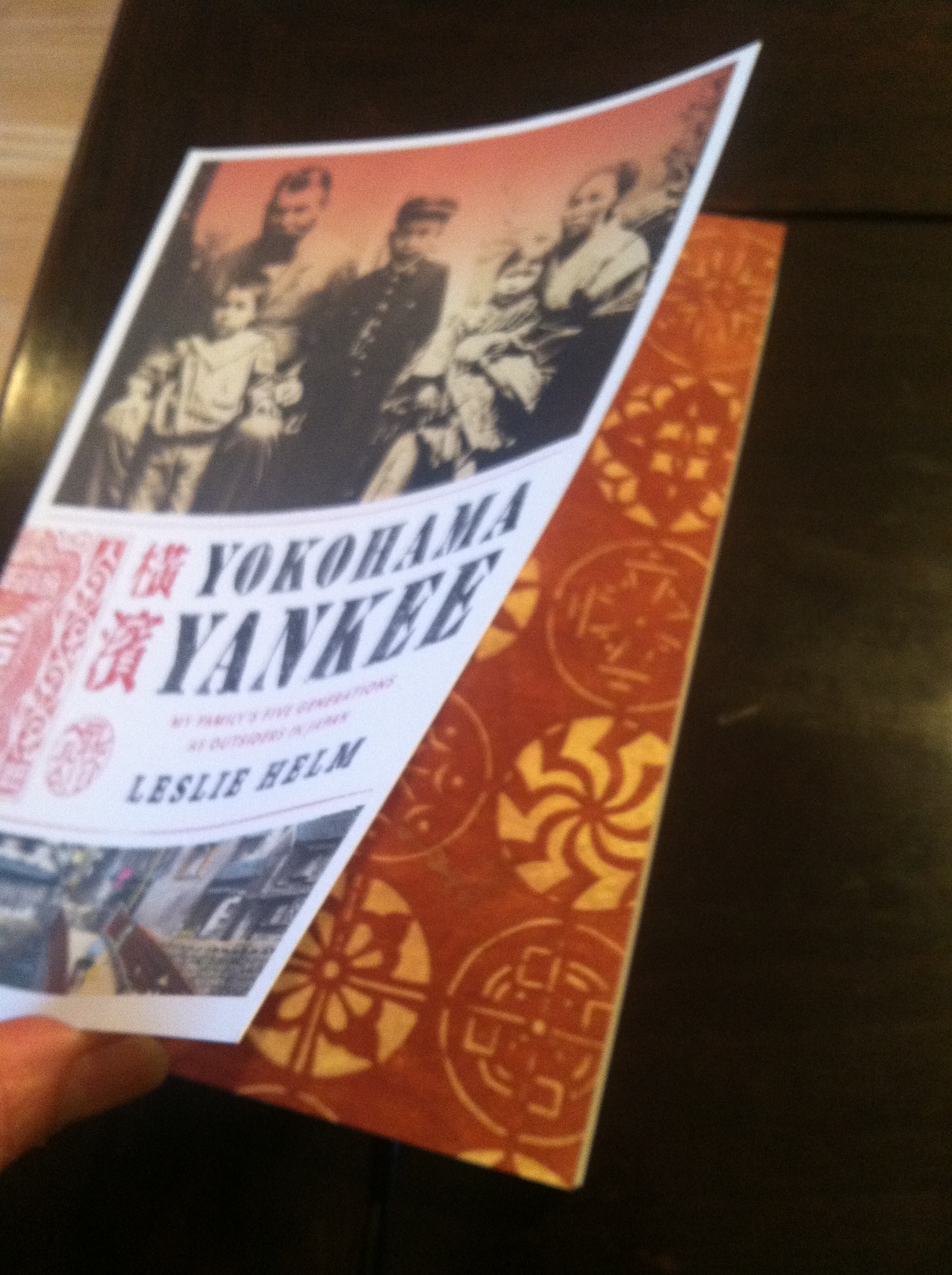 I just attended my first literary event last weekend. The Mazama Festival of Books took place in the Methow Valley, about three and a half hours northeast of Seattle. The trip took an extra hour because mudslides had closed a mountain pass. But it was well worth the detour. I had lots of time to get to know the other 17 authors presenting over dinner and drink in one of the most beautiful settings in the world.
I just attended my first literary event last weekend. The Mazama Festival of Books took place in the Methow Valley, about three and a half hours northeast of Seattle. The trip took an extra hour because mudslides had closed a mountain pass. But it was well worth the detour. I had lots of time to get to know the other 17 authors presenting over dinner and drink in one of the most beautiful settings in the world.
Tucked away in the Cascade mountains, the Methow Valley has an alpine feel to it, though the little villages are more Western than European. The valley is so tucked away, many people in Seattle don’t know of its existences. And local residents like to keep it that way. A couple decades ago, they fought efforts by developers to build a ski resort there, a successful battle that prevented that rural paradise from becoming another Vail or Aspen. The local general store sells delicious scones baked with fresh blueberries and blackberries. The local inn serves homemade granola filled with nuts and a giant side dish of fruit. And all around you are mountains, forest and meadows.
The stage for the book festival was set up in a meadow so that the audience could see the mountains rising up behind the speakers. To keep the discussions interesting, Art Gresh, the financier who founded the festival and organized it together with the wonderful folks from Methow Arts, brought in from New York, two beautiful and charming young women: Katherine Lanpher, a journalist and former talkshow host, and Lauren Cerand, a book publicist. They had both read the books of the writers they were interviewing and took charge of the stage with grace and wit while always managing to draw out the best of each writers. I haven’t yet read the works of all the writers but I plan to. Meawhile, I found their lives as engaging as I expect to find their works.
The first session was “Writing Wilderness.” Shannon Huffman Polson, a former Microsoft executive, spoke of her book “A Border Life” about how she set out on a pilgrimage to retrace the steps her parents took when they were killed by a grizzly bear. Asked by Katherine what wilderness was, she defined it as the place in nature where you are no longer in control of your surroundings. Ana Maria Spagna, also on the panel, worked for many years for the park service and lives in an isolated corner of Lake Chelan unconnected to the rest of the world by road. She saw wilderness in a friendlier light, a place where people could live in communion with nature. Ana is the author of half a dozen books including Potluck: Community on the Edge of Wilderness.
Two other artists who derive their inspiration from nature are Dia Calhoun, a children’s book writer, and author most recently of “After the River the Sun,” about a boy who loses both his parents to drowning and is sent to live with his uncle in the country. The boy, who initially wants to do nothing more than play games, falls in love with the countryside. Dia says she used to call herself a writer of young adult fiction, but had to keep aiming at a younger audience to find the innocent children she loves to write for.
Nikki Mcclure makes papercuts that are impossible to describe in words. You just have to see the beautiful work.
Nikki says the we are overloaded in modern society. “When you disconnect from that you open your natural senses and they bring you back to yourself.“ She says that when she hears the osprey talking, she can tell the salmon are coming. Many of her woodcuts focus on seasonal themes.
Dia and Nikki both stressed the importance of periodically leaving behind the things that tether us to the modern world and reconnecting with the wilderness. “We forget we are part of nature. We live observed lives,” says Dia. “In nature you are not observed so you can observe.” In addition to writing books, Dia also designs corporate logos to help make a living. She did the Alaska Air logo and the tailwork for Aloha Airlines.
Shawn Vestal read from a short story that drew on his childhood growing up as a Mormon. His writing was beautifully crafted, and was interested to learn that he’d been a newspaper writer most of his life and went back to school in his 40s to get his Masters in Fine Arts. He says the degree taught him to do what he needed to do to write well.
My session was called “The Map of Memory” and I was surprised at how many people connected to my talk about Japan. One of the young men working at the Trail’s End Bookstore, which had all of our works for sale, had studied Japanese for three years while another had actually grown up in Japan. Among others in the audience many had traveled to Japan or done business with the Japanese. All had good memories of japan.
The most fiery session of the festival was the one entitled “under pressure.” Peter Nathaniel Malae, a man of Samoan heritage and author of Our Frail Blood believes that to write about violence in an authentic way you have to have experienced it—to have it in your bones. “By the age of ten I understood violence. My stories are from real life, not from research.”
He’s a big fan of Hemingway and likes to quote what he wrote in Death in the Afternoon: “If a writer of prose knows enough of what he is writing about he may omit things that he knows and the reader, if the writer is writing truly enough, will have a feeling of those things as strongly as though the writer had stated them. The dignity of movement of an iceberg is due to only one-eight of it being above water.” What Hemingway is saying, says Peter, is that “The authority of the story in not in the scene. You feel the force of it.”
Peter says he writes 500 words a day. He writes about the immigrant experience including how, in the process of becoming American, you lose your indigenous culture. He says that all his best friends are imaginary, fictitious characters. “I don’t cook it up. It’s happening in my brain. I’m not aware of it.” He says he believes that books should be at least 51 percent hope for the sake of the reader, but he doesn’t’ think he succeeded with his latest book.
On the stage with Peter was Vanessa Veselka, author of the award-winning book “Zazen.” She says the book is about “What do you do when there is nothing to do.” Or, in more frightening terms “sitting still in fire.” She says there should be a price to pay for ugliness. She says readers are so trained to look for the love story that she is careful to avoid setting scenes that will lead the reader in that direction. She also tries to avoid sanitized discussions of important issues like race. In Zazen, for example, she writes about how her character’s leftist mother is happy to have black grandchildren, a not-so-veiled criticism of the tendency to exoticize race. Vanessa says our nation needs to find something to unify the races. “The center cannot hold. We need something greater than geography and money to sustain a people.”
Sharma Shields read from her funny, beautiful and yet dark book of short stories “Favorite Monster,” while Ellen Welcker read from beautifully moving prose book “The Botanical Garden.”
Peter Mountford read from his upcoming book “The Dismal Science” which, like his earlier book, delves into the moral choices we make as market forces push us to make questionable decisions. Also on his pane was Scott Elliott, a creative writing professor at Whitman who recently completed the beautifully written novel “Temple Grove.” He says his approach to writing is to “Put characters in places where their principles are challenged.” The key thing, he says is to have a rich question you want to explore. Ideally, you don’t know the answer making it more likely that you will surprise yourself.
Some of my favorite sessions came toward the end. Alexis Smith read from her book “Glacier,” which starts with starkly simple language but keeps adding layer upon layer to the characters as the story progress until, after a short 150 pages, you love the character and hate to leave them behind. On the same panel was Greg Spatz who read from a book of short stories “Half as Happy.” Spatz is a miracle worker who not only writes amazing stories and is a professor of creative writing, but manages to do this while also traveling 100 days of the year playing the fiddle in a band. I ascribe his success to his wonderful wife, who accompanied him to the festival and even played some tunes for us together with her husband.
The last session was presented by Kate Lebo and Jessica Lynn Bonin who collaborated to produce “A Common Book of Pie.” Kate, who teaches pie making, wrote the recipes and the poetry while Jessica painted the illustrations. Part of the book is a kind of astrology of pie. Kate asked members of the audience what their favorite pie was and based on that choice read a poem that described their personalities. Each was charming and perceptive and somehow always seemed appropriate.
I’ve now been invited to read at quakelit, a book festival in San Francisco. It will be a bigger crowd, but I can’t imagine any literary experience as rich and rewarding as the Mazama Book Festival.
